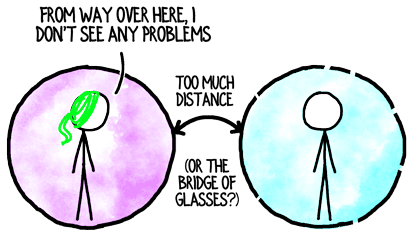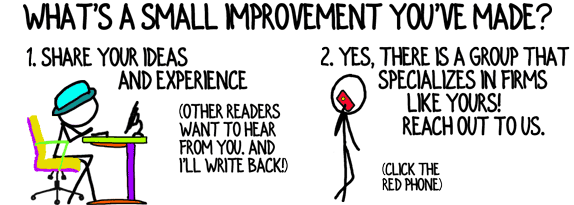Three People Who Can Spot Little Things Holding Your Consulting Firm Back
There are a couple of little steps in your consulting firm’s normal routine that are dampening your performance.
If you tweaked them just a smidge, you’d attract more prospects, encounter more opportunities, win more valuable projects, delight more of your clients, deliver higher quality in less time, endure less stress, and get along better with your in-laws. (Okay, maybe not that last one.)
What are those couple of little steps?

That’s the right question to ask, but not the first question to ask. We’ll talk about the first question in a moment.
We all have room for growth. We’ve all face-palmed when someone pointed out a simple mistake we were making that reduced our effectiveness.
Maybe it was forgetting to ask for the next appointment at the end of every call with a prospect. Or your emails didn’t include a signature with contact information. Or the cookie jar wasn’t on automatic resupply.
The challenge is this: how do you proactively find those little errors that are so baked into your consulting firm’s routines that you don’t even notice them? How do you uncover the opportunities that never even occur to you?
The answer revolves less around how, and more around who. Who can spot improvement opportunities for your consulting firm that you miss?
Requirement #1: Someone who has experience in your business. They have trodden the same path you’re walking and understand the nuances of running a consulting business. In other words, an Insider.
Requirement #2: Someone who is not so immersed in how your consulting firm operates, that they accept your processes and SOPs as gospel. In other words, an Outsider.
The perfect person to reveal your consulting firm’s opportunities is an…
Outside Insider.
Someone who deeply understands your business (i.e., consulting), and also isn’t 100% bought into your operating approach.

Two or three sources of Outside Insiders are virtually at your fingertips, depending on the size of your consulting firm.
Three Outside Insiders Who Can Spot Little Things Holding Your Consulting Firm Back
3-6 Month Employee
Your employees have gained familiarity with most of your consulting firm’s processes and approaches by their sixth month working for you. They’ve also had time to ask questions, receive answers, absorb your rationale then work through your processes again.
However, they haven’t forgotten (yet) that your approaches seem wrong or strange.
Ask those employees to make a list of everything they can think of about your consulting firm that fits under the following title:
“I still don’t understand why we do it this way.”
Advisor/Consultant
You play the role of Outside Insider for many of your clients—you have relevant experience and understand their business, yet you bring outside perspective.
The same benefits you confer on your clients could be applied to your business by an expert in small consulting firms. You’ll receive advice that elicits, “Oh man, is that all it takes? That is so simple. Why wasn’t I doing that years ago?”

Peers
Other leaders of small consulting firms are perfect candidates. They have Insider knowledge of running a firm like yours, yet they’re outside your firm. While they don’t have as much experience as an Advisor/Consultant who specializes in consulting firms, their experience is extremely relevant.
Solicit input and advice from other practitioners on an ad hoc basis or, perhaps, as part of a formal activity—an annual get-together or monthly mastermind of some sort.
Fortunately, you’re already part of a peer group!
Other people reading this article are just like you—leaders of small consulting firms. Some readers are solo practitioners, while others are leaders in practices ranging from a few employees to a couple of hundred personnel. (Yes, a solo practice and $50M firm are both considered small.)
For the next 30 seconds, you can play the role of Outside Insider for hundreds of other readers.
What is one small improvement you made that has noticeably changed your consulting firm for the better?
Text and images are © 2024 David A. Fields, all rights reserved.

 David A. Fields Consulting Group
David A. Fields Consulting Group 

Improve focus by actually implementing the best 2-3 of the 100 creative ideas I’ve had…
Implementing is the key, right Doc? Good tease! Now, please share: what are the best 2-3 ideas you’ve had?!
(Anxiously awaiting your insights…)
1) More speaking 2) Less time in networking groups 3) Less time on low probability prospects
Perfect, Doc! All three of those habits will serve every consultant well. (You’re a smart cookie.)
Hello, David I’ve always enjoyed your thoughtful articles and cute cartoons, thank you for your e mails. One small improvement I’ve made that has improved my coaching practice is go back to writing on a white board the names of prospective clients rather than only having them in a CRM. I’m a visual person so when I “see”their names on the board it calls me into taking an action on next steps with that prospect(s) by keeping them present for me rather than buried in my computer.
Wow, Jody, that’s great! There are all sorts of studies that suggest physically writing something on paper (or a whiteboard) creates a more pronounced impact on the writer than typing the same information into an electronic device. You’ve translated that phenomenon to your CRM, which is a fabulous approach.
Well done, Jody. I’m sure other readers will pick up on your suggestion!
Dave,
Great read and great advice. My wheels are turning in my head, and I have two people I want to ask for feedback/suggestions. Thanks
Perfect, Kevin. Reach out to those two people today.
Then let me know their suggestions! What you hear from your Outside Insiders will probably apply to other readers too.
I’m glad you shared your intention, Kevin!
A silver lining to the pandemic was I connected to a number of different people working in small to mid-size companies ranging from consulting to corporate. While the initial conversations were focused on creating community and being connected (many had never been in a remote or W@H environment) eventually we started asking how each other “worked” from marketing to process and workflow. Keeping those connections has been vital to me for personal growth and as the kind of consultants noted above. I haven’t had any request made turned down and I offer the same openness to a chat to anyone here, I’ll share the good, bad, and “I can’t believe I tried this – don’t!” lessons I’ve learned.
Excellent case study, Bill. You actively created a community of Outside Insiders, and it’s benefitted you.
I appreciate your generosity in offering yourself to others, too. You’re a model for the community, Bill!
I really love the idea of asking a 3-6 month team member for their feedback. Brilliant! Thank you, David, for another keeper.
Gabrielle, you’ve pointed out something that I overlooked: the 3-6 month employee doesn’t have to be an employee, per se. As long as they’re someone who has worked closely with you for a good period of time, they’ll have insights on how you can improve.
Thank you for extending that idea and making it better, Gabrielle!